https://ift.tt/eA8V8J
Batterygate payout, the death of iTunes for Windows and a €13 billion tax dispute: all the Apple news you missed this week, in a handy bite-sized roundup
from Latest iPhone Articles from Macworld UK https://ift.tt/2WxWD7v
Saturday, July 18, 2020
Friday, July 17, 2020
Google Store Daily Deal: Save $75 on Nest Hub Max 2-pack
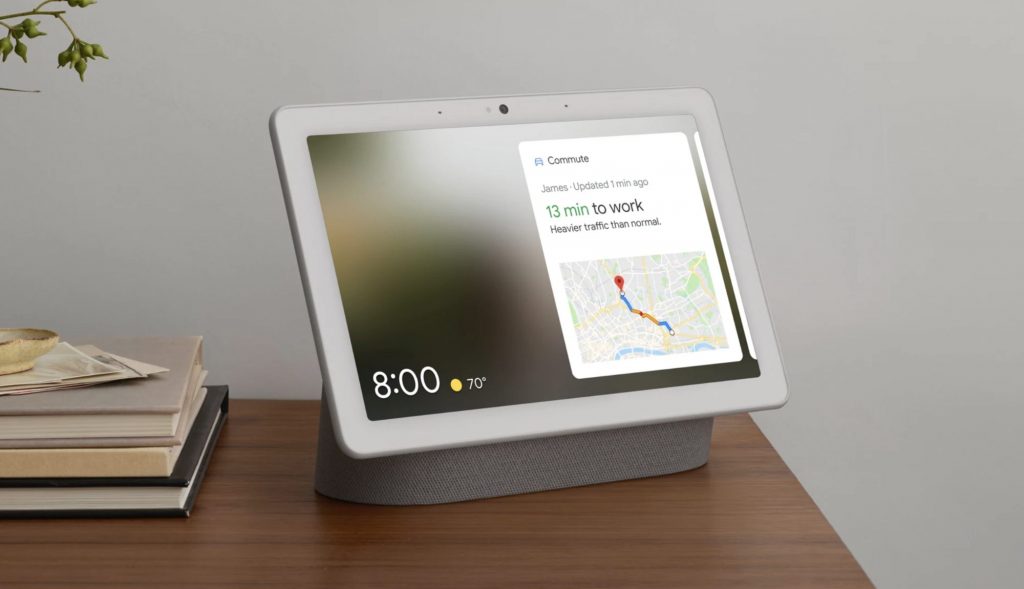
via Chrome Unboxed – The Latest Chrome OS News https://ift.tt/32Gxfk7
Future Apple Pencil Could Have Sensor to Sample Colors From the Real World
https://ift.tt/2ZEKlfA
Apple is exploring new Apple Pencil technology that could allow the device to sample colors from the real world to use in digital art, drawings, edits, and more, according to an Apple patent application published by the United States Patent and Trademark Office this week.
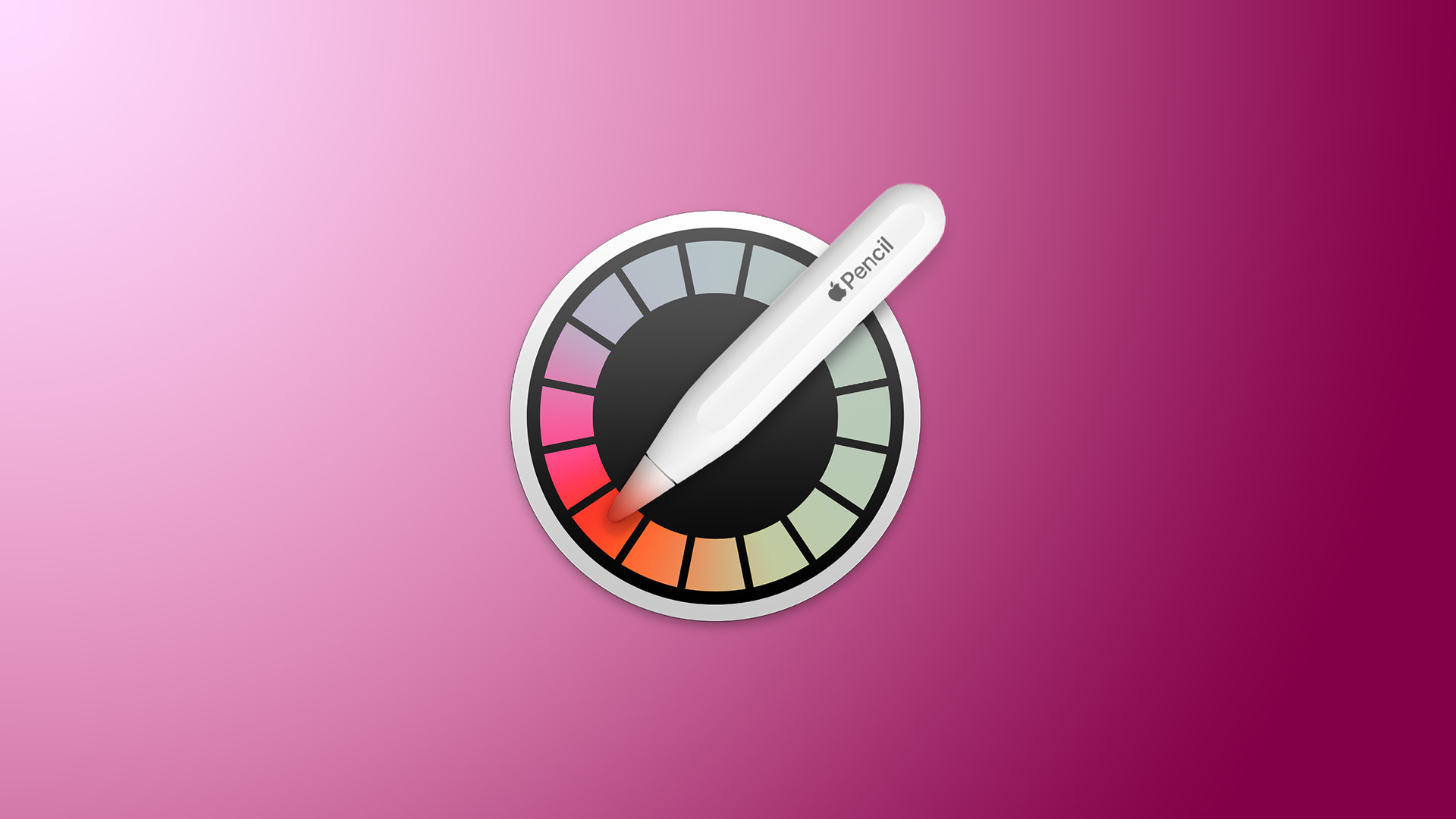
Titled "Computer System With Color Sampling Stylus," the patent describes a computer stylus that "may have a color sensor."
The color sensor would be equipped with several photodetectors able to measure light for different color channels, which would let it detect and sample a color from a real world object, like a flower.
The stylus could also be equipped with a light to make it easier for the photodetectors to accurately determine a color, and the rest of the patent describes an Apple Pencil-like design with an elongated body, a tip, and an opposing end, with the tip able to work with a touch-sensitive display.
Apple says the color sensor functionality could be located at the end of the stylus, at the tip, or coupled to the tip through a light guide.
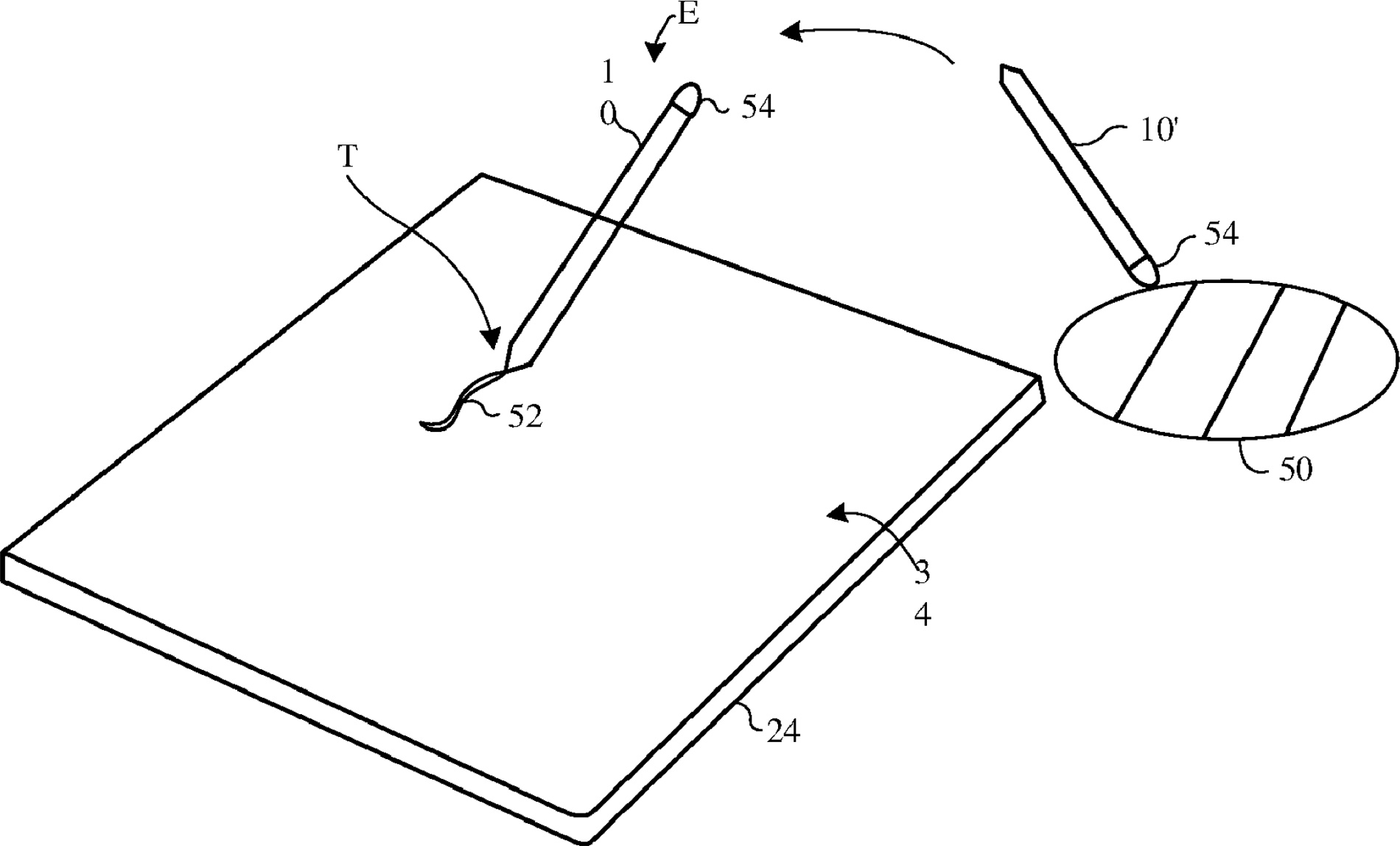
With this kind of technology, Apple Pencil users would be able to do something like hold the Apple Pencil against an object in the real world, with the Apple Pencil reading the color. It could be used for photorealistic paintings or just sampling of unique colors from grass, plants, existing art, and so much more.
According to the patent, the stylus would detect the color and then put it in a color palette in a drawing program, where the color could be assigned to a brush. Apple also suggests that color sensor could perhaps be used for other purposes such as calibrating displays, calibrating printers, making health-related measurements, and identifying paint colors for home projects, which would make the Apple Pencil even more versatile.
Optical color sensors like this already exist and have been used in various ways. In fact, we've tested a simple, rudimentary optical color sensor in the Sphero Specdrums, a product meant to turn color into sound. This product includes a little finger ring that can be tapped against real world objects to make sounds based on the color it senses, but Apple's implementation would presumably be much more precise.
Apple patents all kinds of different technologies, some of which seem plausible to implement and others that are quite fantastical. There's never any guarantee that Apple's patents will be used for real products, and in fact, most patents are for technologies that never get released.
For that reason, there's no word on whether Apple actually plans to add a color sensor to the Apple Pencil, or if this is simply an idea that's never going to make it out of the possibilities phase.
This article, "Future Apple Pencil Could Have Sensor to Sample Colors From the Real World" first appeared on MacRumors.com
Discuss this article in our forums

from MacRumors: Mac News and Rumors - All Stories https://ift.tt/2WsTmGM
Apple is exploring new Apple Pencil technology that could allow the device to sample colors from the real world to use in digital art, drawings, edits, and more, according to an Apple patent application published by the United States Patent and Trademark Office this week.

Titled "Computer System With Color Sampling Stylus," the patent describes a computer stylus that "may have a color sensor."
The color sensor would be equipped with several photodetectors able to measure light for different color channels, which would let it detect and sample a color from a real world object, like a flower.
The stylus could also be equipped with a light to make it easier for the photodetectors to accurately determine a color, and the rest of the patent describes an Apple Pencil-like design with an elongated body, a tip, and an opposing end, with the tip able to work with a touch-sensitive display.
Apple says the color sensor functionality could be located at the end of the stylus, at the tip, or coupled to the tip through a light guide.

With this kind of technology, Apple Pencil users would be able to do something like hold the Apple Pencil against an object in the real world, with the Apple Pencil reading the color. It could be used for photorealistic paintings or just sampling of unique colors from grass, plants, existing art, and so much more.
According to the patent, the stylus would detect the color and then put it in a color palette in a drawing program, where the color could be assigned to a brush. Apple also suggests that color sensor could perhaps be used for other purposes such as calibrating displays, calibrating printers, making health-related measurements, and identifying paint colors for home projects, which would make the Apple Pencil even more versatile.
Optical color sensors like this already exist and have been used in various ways. In fact, we've tested a simple, rudimentary optical color sensor in the Sphero Specdrums, a product meant to turn color into sound. This product includes a little finger ring that can be tapped against real world objects to make sounds based on the color it senses, but Apple's implementation would presumably be much more precise.
Apple patents all kinds of different technologies, some of which seem plausible to implement and others that are quite fantastical. There's never any guarantee that Apple's patents will be used for real products, and in fact, most patents are for technologies that never get released.
For that reason, there's no word on whether Apple actually plans to add a color sensor to the Apple Pencil, or if this is simply an idea that's never going to make it out of the possibilities phase.
Tags: patent, Apple Pencil
This article, "Future Apple Pencil Could Have Sensor to Sample Colors From the Real World" first appeared on MacRumors.com
Discuss this article in our forums
from MacRumors: Mac News and Rumors - All Stories https://ift.tt/2WsTmGM
iOS 14's Compact Interface: Phone Calls, FaceTime, Siri and More
https://ift.tt/3hf5Zgx
iOS 14 introduces several compact user interface elements that iPhone users have been requesting for years, such as a minimized phone call pop up that doesn't take over the entire screen and a smaller Siri window that doesn't dominate the display.

This guide covers all of the new compact UI elements that Apple has added, but for more details on iOS 14 design changes, make sure to check out our Home Screen guide and our full iOS 14 roundup.
When you're in the middle of using your iPhone and a phone call comes in, it's frustrating to have the incoming call take over the iPhone's display, especially if it's a spam call that you don't care about.
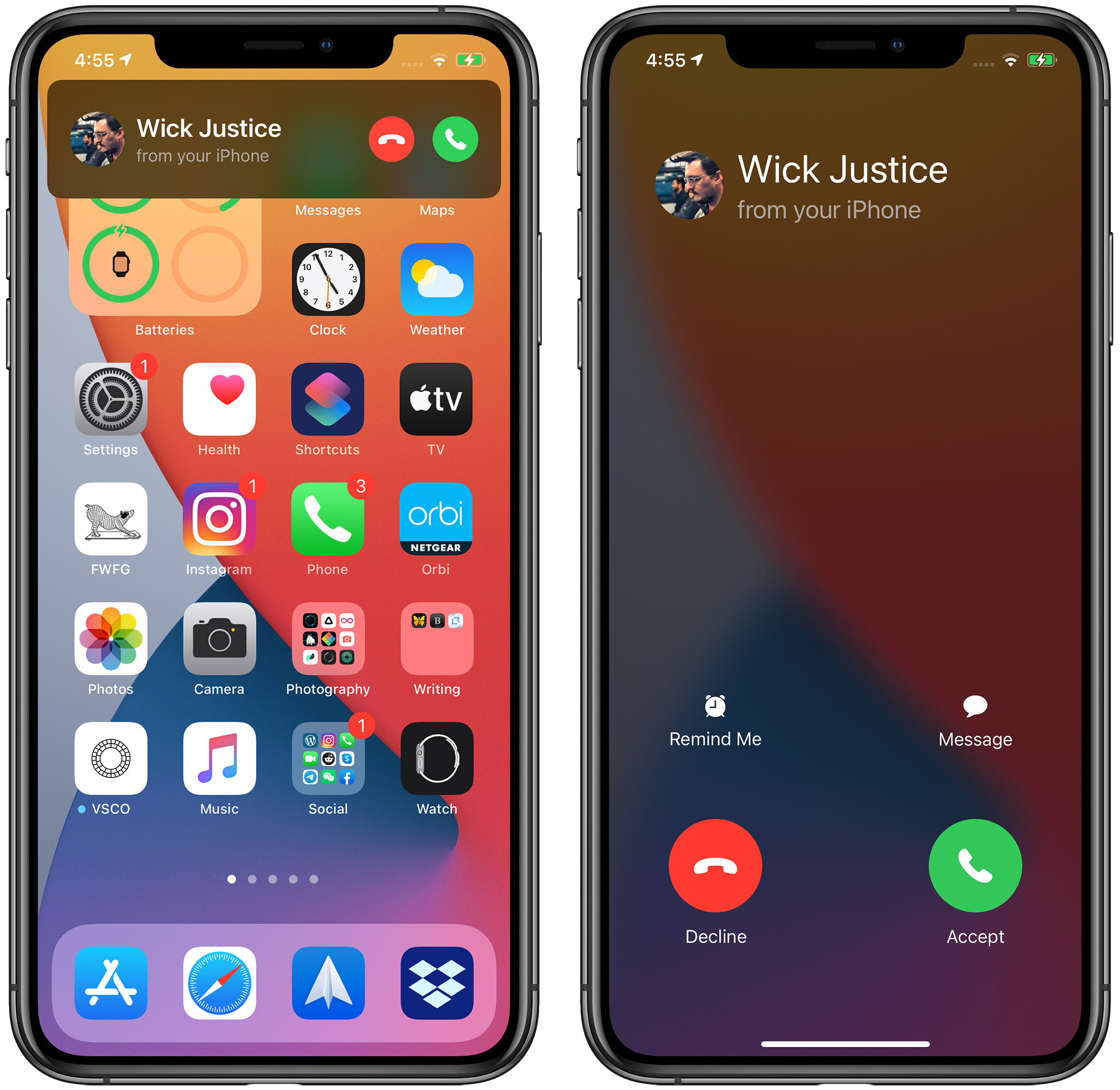
That's no longer a problem in iOS 14, because incoming phone calls are shown in a notification banner rather than a full incoming phone call display like in iOS 13.
Phone calls are only shown in banner format when your phone is unlocked and in use, so when your iPhone is locked, the Lock Screen interface where with the slide to unlock bar is still present.
You can tap on the decline button of incoming phone call banner to decline the call right away. Tapping on the accept button (or anywhere else on the banner) opens the standard full phone call interface, where you have to tap a second time to accept or decline a call. If you swipe the banner away, you can continue to use your iPhone as normal while the phone rings in the background with a small icon shown over the time at the top left of the display.
Once you tap a phone call banner and open the full display interface, you'll need to accept or decline the call to get out of the phone call view. If you've swiped the banner away, you can tap on the call icon in the upper left corner of the display to get to the call interface.
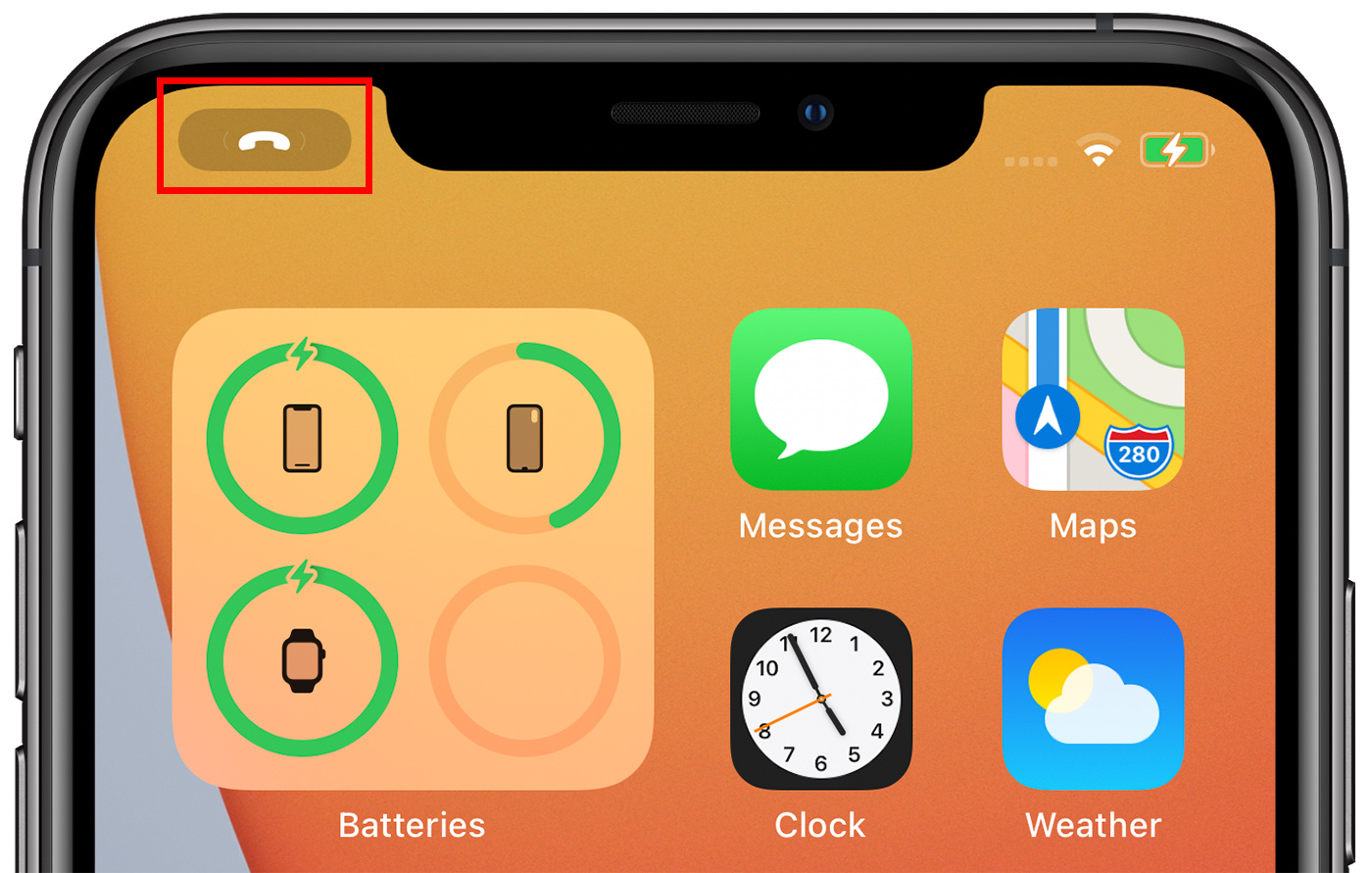
Incoming FaceTime calls in iOS 14 look the same as incoming phone calls when the iPhone is in use, showing up as a banner that can be swiped away or tapped to accept or decline a call. Note that FaceTime calls only show up in banner format when the iPhone is unlocked and in use. On the Lock Screen, FaceTime calls continue to take up the whole screen and will activate the camera.
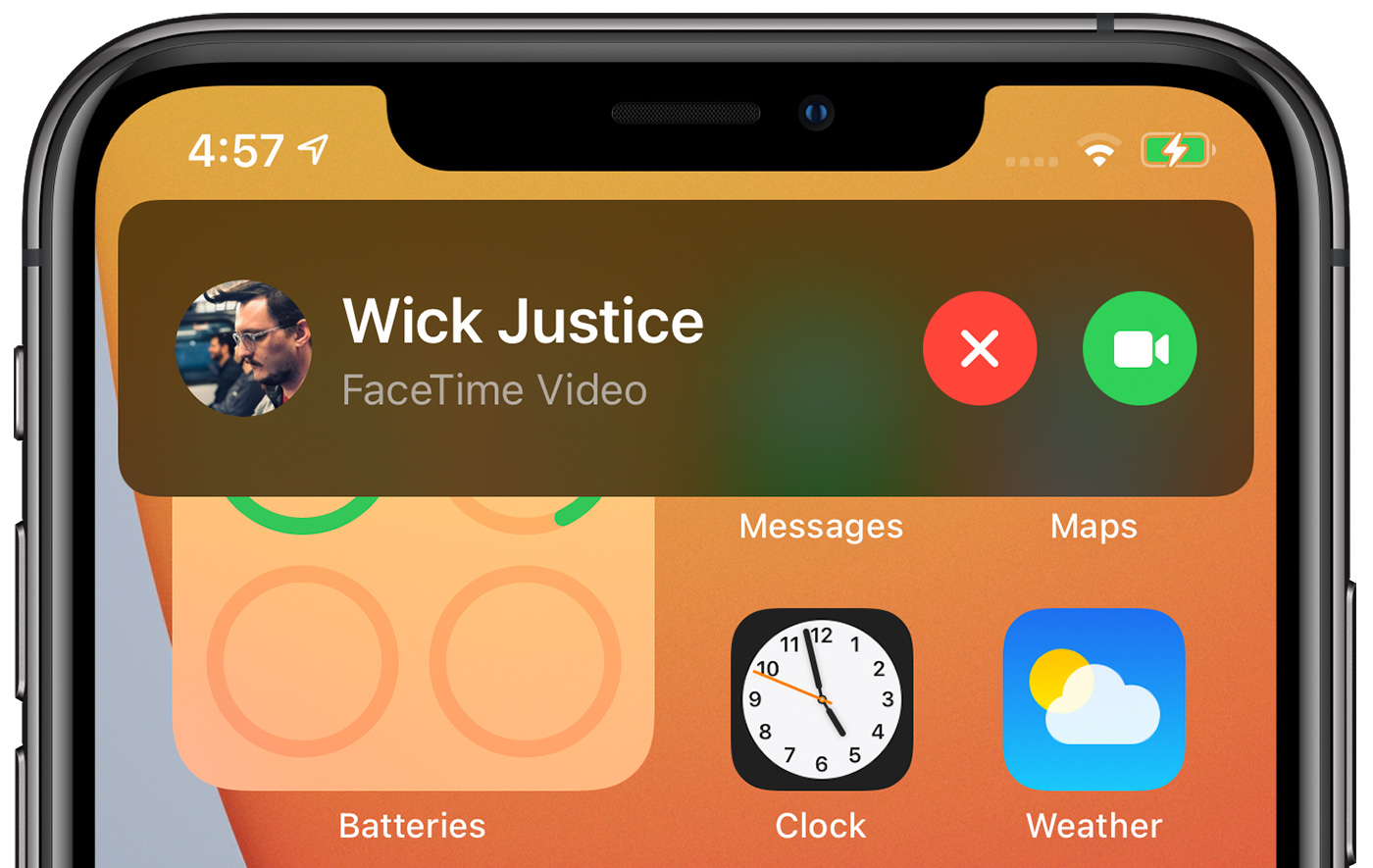
Tapping on a FaceTime call banner will extend the FaceTime call interface to the entire display as it works in iOS 13, where you can either decide to accept or decline the call. Tapping right on the "X" button will automatically decline the call from the banner, however.
Swiping the FaceTime banner away allows the FaceTime call to continue ringing in the background without disturbing you. You'll see the FaceTime icon over the time in the upper left corner of the display, which you can tap to get back to the FaceTime interface if you want to accept or decline the call. Otherwise, it rings in the background for a few seconds until it registers that you're not picking up.
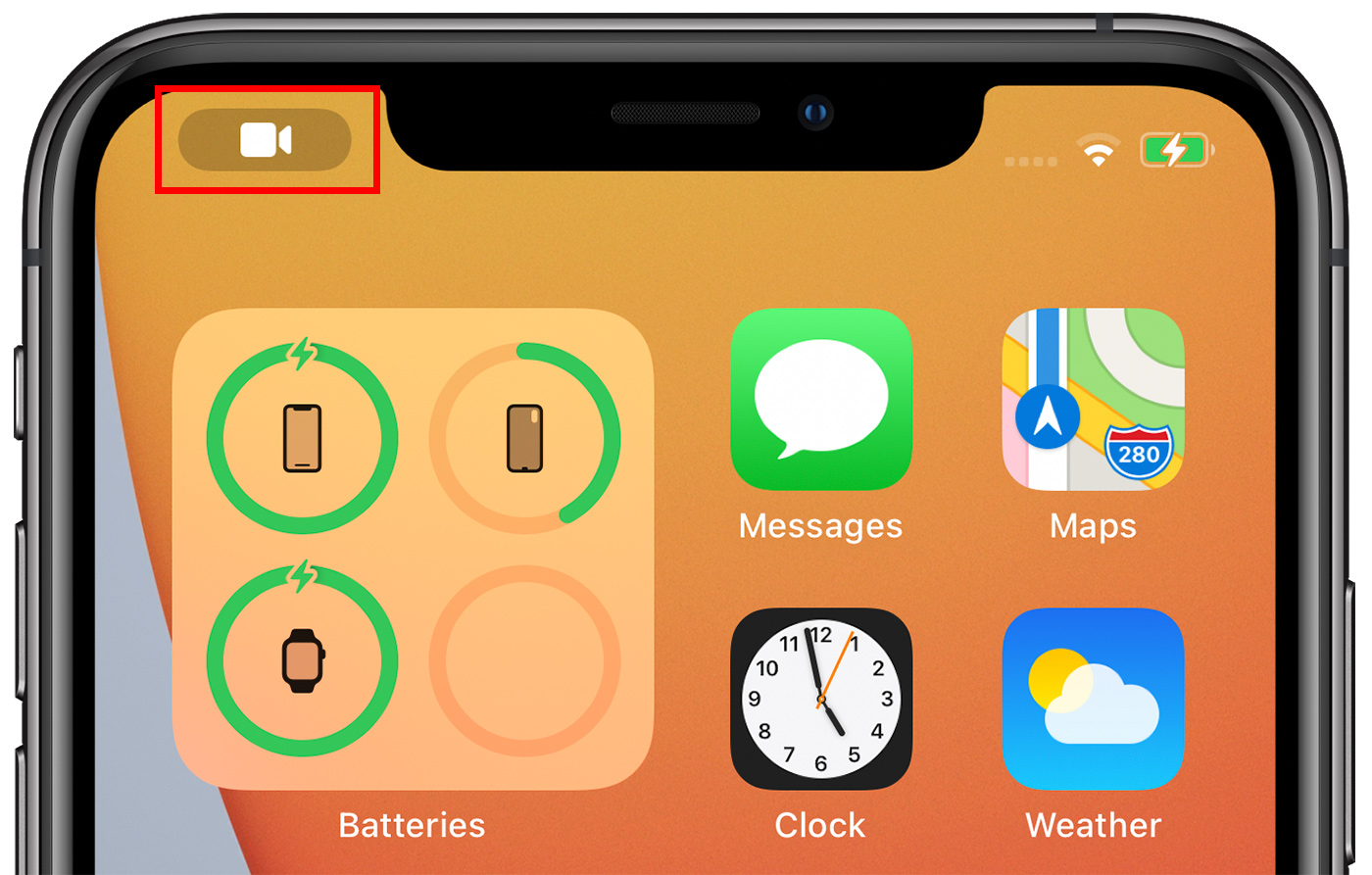
Once you've tapped on a FaceTime call banner or icon, the FaceTime call expands to the full display and the only way to get out of the interface is to accept or decline the FaceTime call.
Apple created a new API for the collapsed call interface that will let developers incorporate the feature into third-party VOIP apps like Facebook Messenger, WhatsApp, Skype, and tons more.
App developers will need to implement this API into their apps before their apps will be shown with the updated call interface.
Apple considers the new Picture in Picture mode on iPhone to be part of the updated compact user interface in iOS 14. With Picture in Picture mode you can watch TV shows, movies, and videos from apps and the web while doing other things on your iPhone with the content shown in a windowed view.
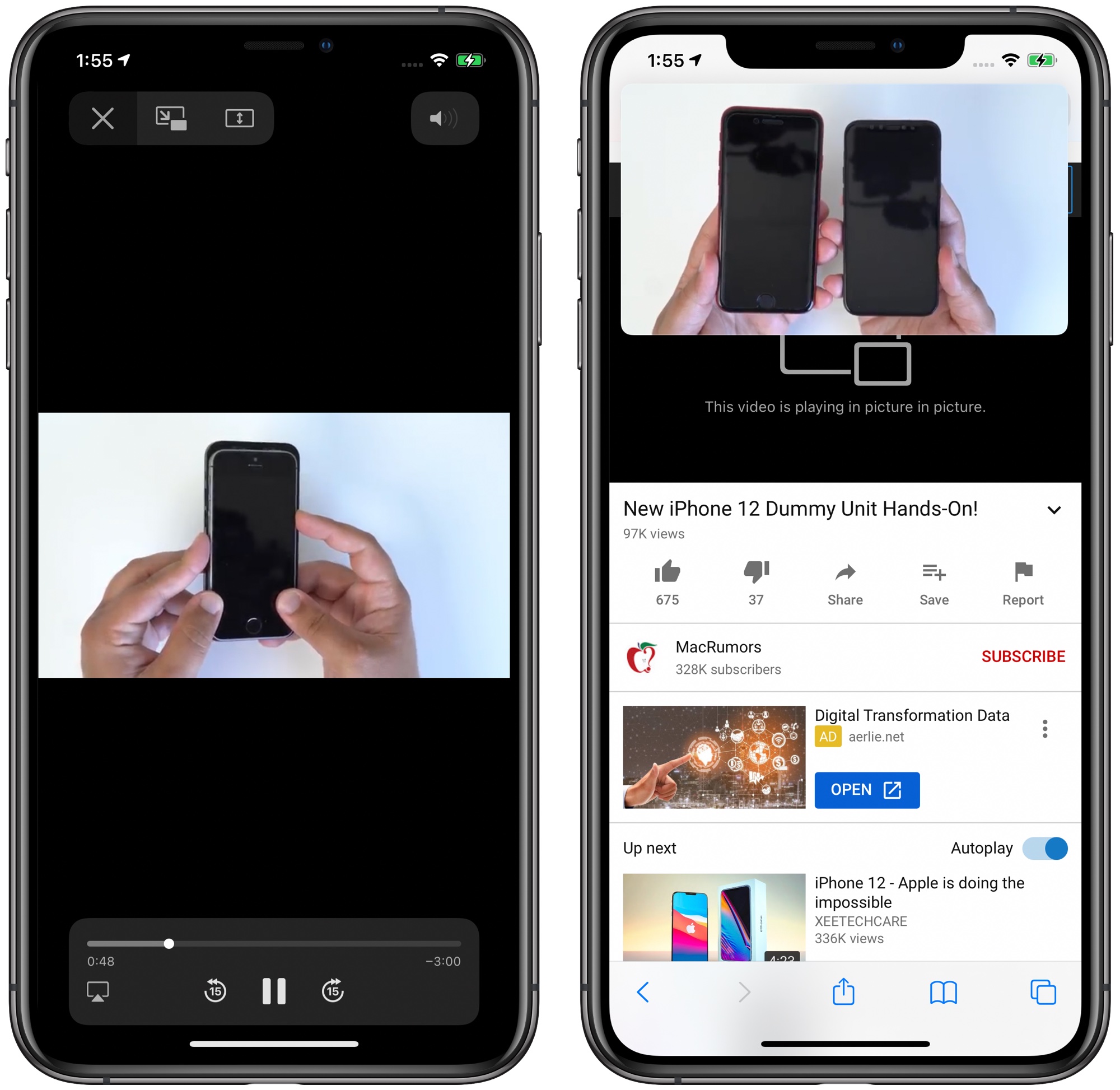
There's a FaceTime Picture in Picture feature that's even more useful because there's now a way to carry on a FaceTime conversation while also using your iPhone as normal. In iOS 13, exiting out of the FaceTime app pauses the FaceTime video for the person you're speaking with, but in iOS 14, exiting out of FaceTime collapses the video view into a small window so both parties can continue their discussion.
We have a Picture in Picture guide with complete details on how the feature works, so make sure to check that out for more info on the Picture in Picture feature.
Siri requests in iOS 14 are also part of the compact interface, and activating Siri no longer takes over the entire iPhone. Instead, when you activate Siri through a "Hey Siri" voice command or through a physical button, a circular, animated Siri icon pops up at the bottom of the iPhone's display.
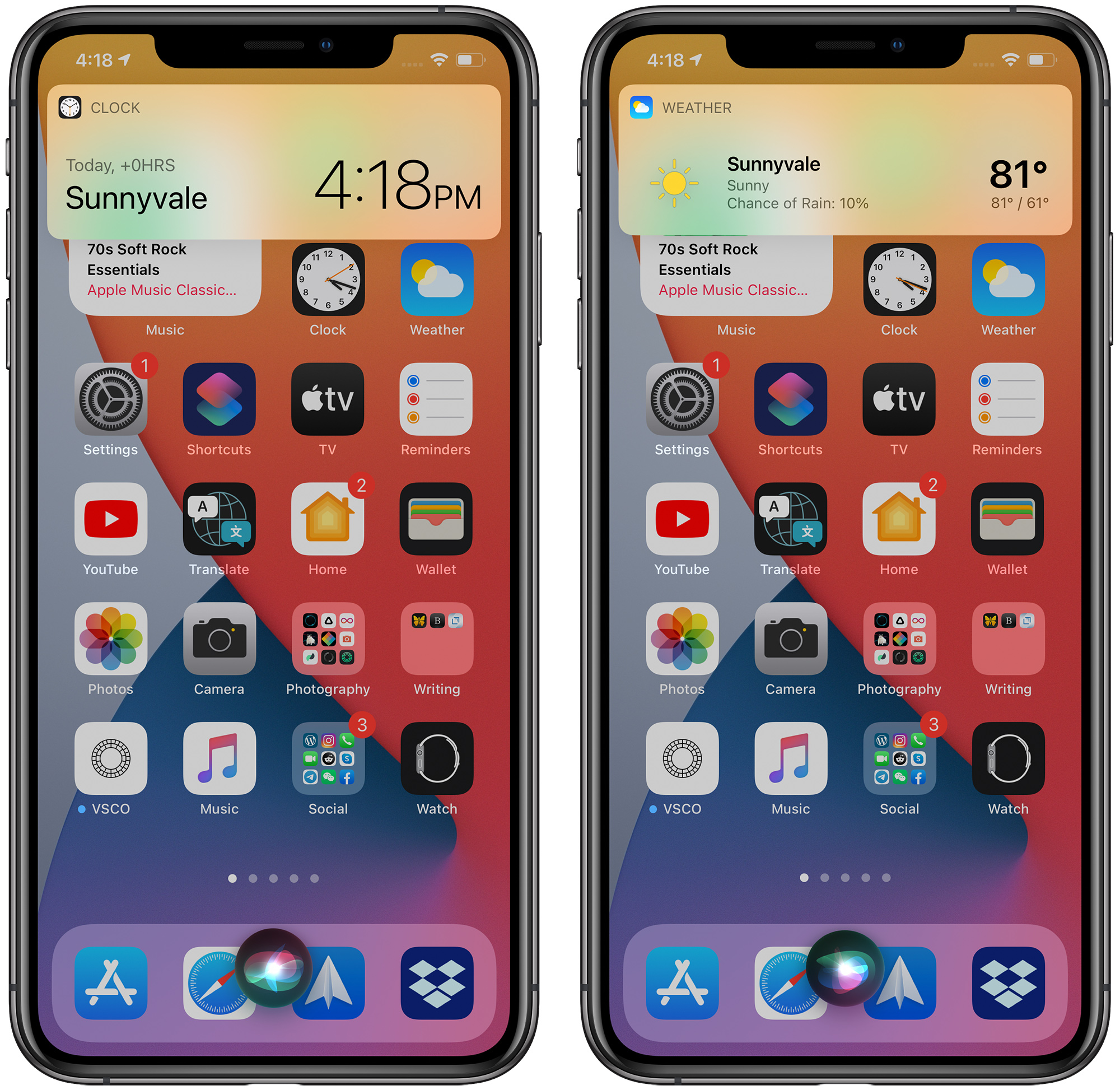
The Siri icon moves as you speak to Siri so you can be sure the voice assistant is listening and picking up what you have to say. Queries are also displayed in a more compact view with information provided at the top in a banner format.
If, for example, you ask Siri the time or the weather, the information is shown in a banner-style popup at the top of the display.
Shorter information is shown in smaller banners, but longer questions may have banners that take up more space. This is especially true of results that involve web searches.
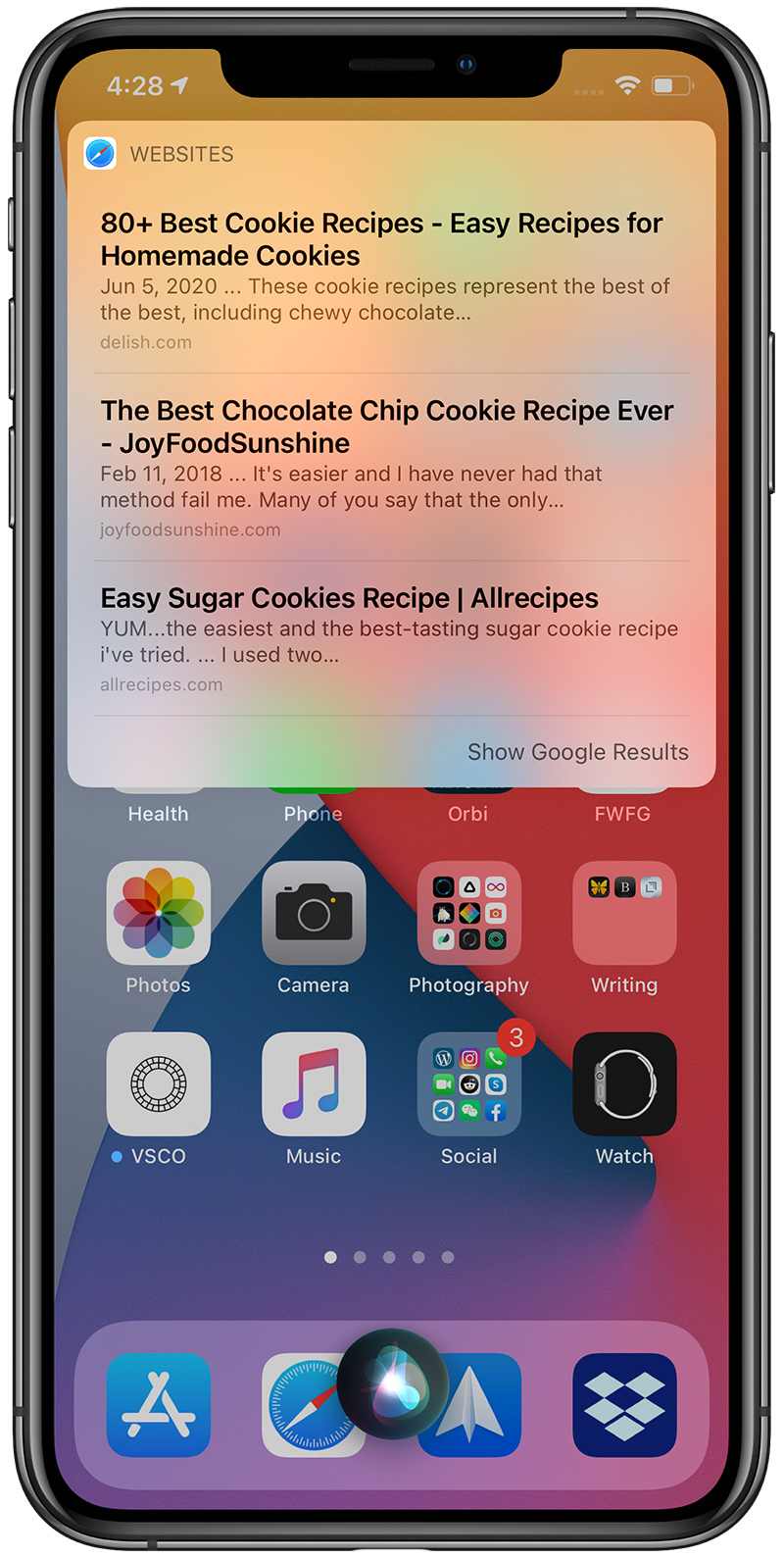
Certain requests, such as those that show off Siri's personality like jokes or product information requests, show the results right above the Siri icon.
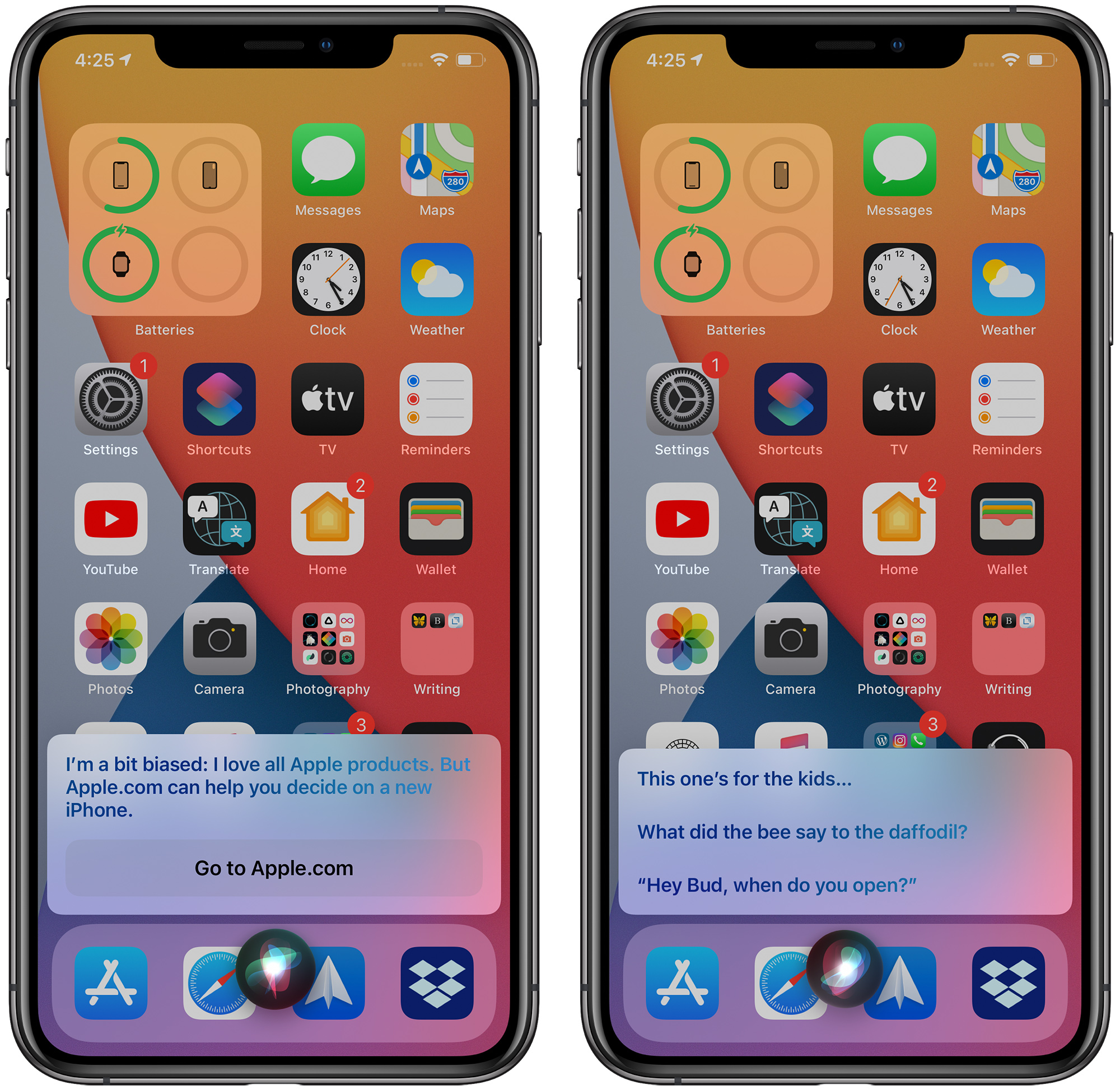
Note that in iOS 14, Siri does not display the text of what you've spoken in order to keep the interface as small as possible, but if you enable the "Always Show Speech" feature, what you're speaking will show up in a small popup over the Siri icon. It's useful to see what Siri hears to make sure the voice assistant is properly interpreting commands.
Turn on "Always Show Speech" by opening up Settings, going to Siri & Search, tapping on Siri Feedback and then toggling on the speech option. You can also turn on captions, which will show captions for all spoken text.
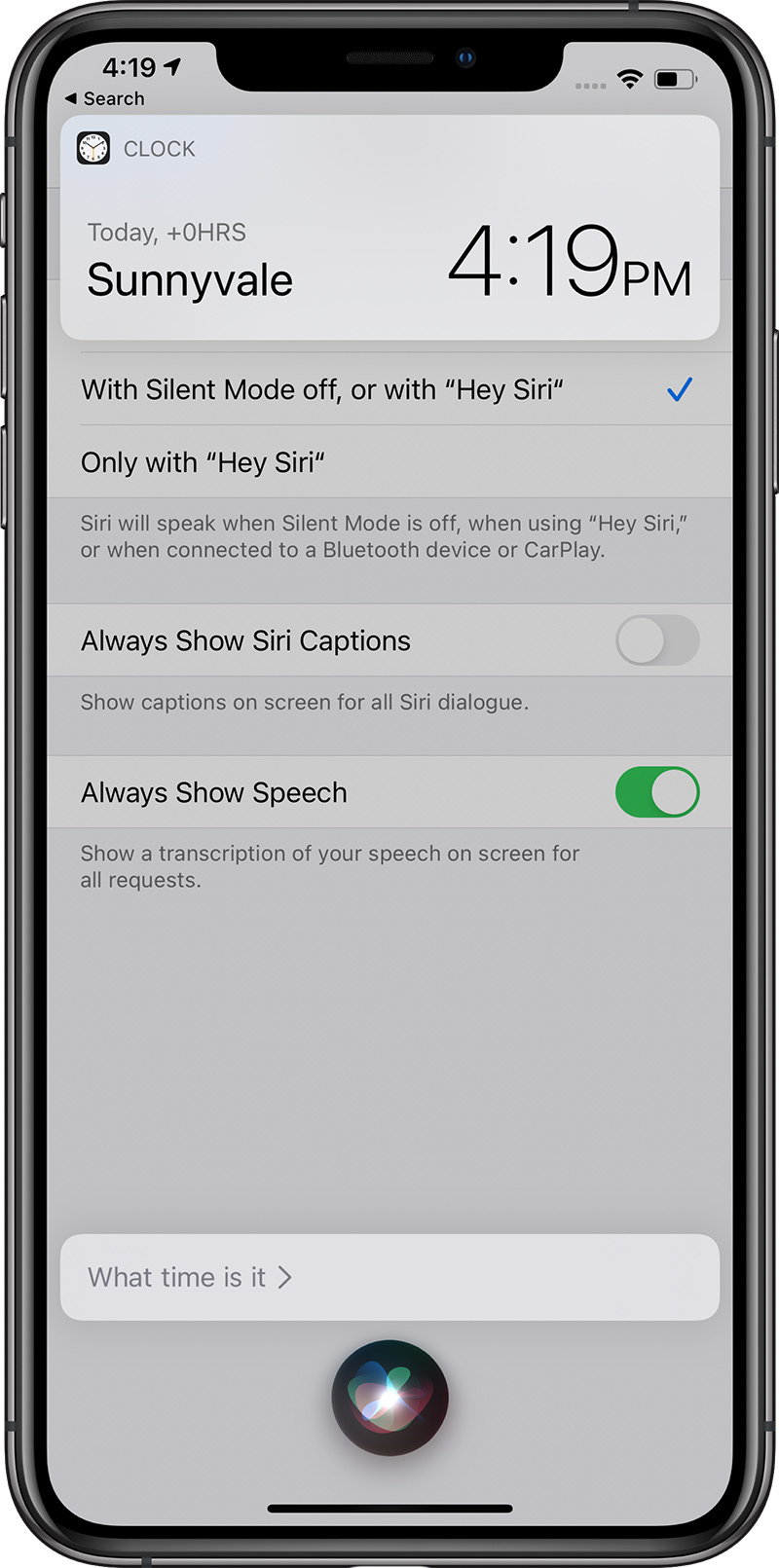
In any Siri result, while the Siri interface leaves the background of the iPhone visible so you can continue to see what you were doing prior to the Siri request, there is no option to interact with other apps while the Siri interface is open. Attempting to tap elsewhere on the display while Siri is active closes the Siri interface.
After activating Siri the first time with a voice command or a physical button, the Siri interface stays open until you tap out of it, so you can tap on the Siri icon to initiate another Siri request. With Siri results that are interactive like web search results or translations, you can tap in the Siri window to execute the search, hear the spoken translation, and more. All in all, Siri in iOS 14 works much the same as it does in iOS 13, but in a way that feels like it's less of an interruption to general iPhone and iPad usage.
Along with the redesign, Siri has a few other new features in iOS 14 such as support for sending audio messages, getting cycling directions, and sharing an Apple Maps ETA with a contact, with how tos covering these new features available below.
Have questions about the interface changes in iOS 14, know of a feature we left out, or want to offer feedback on this guide? Send us an email here. For more on everything new in iOS 14, make sure to check out our iOS 14 roundup and our other iOS 14 guides.
This article, "iOS 14's Compact Interface: Phone Calls, FaceTime, Siri and More" first appeared on MacRumors.com
Discuss this article in our forums

from MacRumors: Mac News and Rumors - All Stories https://ift.tt/3eC5ewk
iOS 14 introduces several compact user interface elements that iPhone users have been requesting for years, such as a minimized phone call pop up that doesn't take over the entire screen and a smaller Siri window that doesn't dominate the display.

This guide covers all of the new compact UI elements that Apple has added, but for more details on iOS 14 design changes, make sure to check out our Home Screen guide and our full iOS 14 roundup.
Phone Calls
When you're in the middle of using your iPhone and a phone call comes in, it's frustrating to have the incoming call take over the iPhone's display, especially if it's a spam call that you don't care about.

That's no longer a problem in iOS 14, because incoming phone calls are shown in a notification banner rather than a full incoming phone call display like in iOS 13.
Phone calls are only shown in banner format when your phone is unlocked and in use, so when your iPhone is locked, the Lock Screen interface where with the slide to unlock bar is still present.
You can tap on the decline button of incoming phone call banner to decline the call right away. Tapping on the accept button (or anywhere else on the banner) opens the standard full phone call interface, where you have to tap a second time to accept or decline a call. If you swipe the banner away, you can continue to use your iPhone as normal while the phone rings in the background with a small icon shown over the time at the top left of the display.
Once you tap a phone call banner and open the full display interface, you'll need to accept or decline the call to get out of the phone call view. If you've swiped the banner away, you can tap on the call icon in the upper left corner of the display to get to the call interface.

FaceTime Calls
Incoming FaceTime calls in iOS 14 look the same as incoming phone calls when the iPhone is in use, showing up as a banner that can be swiped away or tapped to accept or decline a call. Note that FaceTime calls only show up in banner format when the iPhone is unlocked and in use. On the Lock Screen, FaceTime calls continue to take up the whole screen and will activate the camera.

Tapping on a FaceTime call banner will extend the FaceTime call interface to the entire display as it works in iOS 13, where you can either decide to accept or decline the call. Tapping right on the "X" button will automatically decline the call from the banner, however.
Swiping the FaceTime banner away allows the FaceTime call to continue ringing in the background without disturbing you. You'll see the FaceTime icon over the time in the upper left corner of the display, which you can tap to get back to the FaceTime interface if you want to accept or decline the call. Otherwise, it rings in the background for a few seconds until it registers that you're not picking up.
Once you've tapped on a FaceTime call banner or icon, the FaceTime call expands to the full display and the only way to get out of the interface is to accept or decline the FaceTime call.
Third-Party VOIP Calls
Apple created a new API for the collapsed call interface that will let developers incorporate the feature into third-party VOIP apps like Facebook Messenger, WhatsApp, Skype, and tons more.
App developers will need to implement this API into their apps before their apps will be shown with the updated call interface.
Picture in Picture
Apple considers the new Picture in Picture mode on iPhone to be part of the updated compact user interface in iOS 14. With Picture in Picture mode you can watch TV shows, movies, and videos from apps and the web while doing other things on your iPhone with the content shown in a windowed view.

There's a FaceTime Picture in Picture feature that's even more useful because there's now a way to carry on a FaceTime conversation while also using your iPhone as normal. In iOS 13, exiting out of the FaceTime app pauses the FaceTime video for the person you're speaking with, but in iOS 14, exiting out of FaceTime collapses the video view into a small window so both parties can continue their discussion.
We have a Picture in Picture guide with complete details on how the feature works, so make sure to check that out for more info on the Picture in Picture feature.
Siri
Siri requests in iOS 14 are also part of the compact interface, and activating Siri no longer takes over the entire iPhone. Instead, when you activate Siri through a "Hey Siri" voice command or through a physical button, a circular, animated Siri icon pops up at the bottom of the iPhone's display.

The Siri icon moves as you speak to Siri so you can be sure the voice assistant is listening and picking up what you have to say. Queries are also displayed in a more compact view with information provided at the top in a banner format.
If, for example, you ask Siri the time or the weather, the information is shown in a banner-style popup at the top of the display.
Shorter information is shown in smaller banners, but longer questions may have banners that take up more space. This is especially true of results that involve web searches.

Certain requests, such as those that show off Siri's personality like jokes or product information requests, show the results right above the Siri icon.

Note that in iOS 14, Siri does not display the text of what you've spoken in order to keep the interface as small as possible, but if you enable the "Always Show Speech" feature, what you're speaking will show up in a small popup over the Siri icon. It's useful to see what Siri hears to make sure the voice assistant is properly interpreting commands.
Turn on "Always Show Speech" by opening up Settings, going to Siri & Search, tapping on Siri Feedback and then toggling on the speech option. You can also turn on captions, which will show captions for all spoken text.

In any Siri result, while the Siri interface leaves the background of the iPhone visible so you can continue to see what you were doing prior to the Siri request, there is no option to interact with other apps while the Siri interface is open. Attempting to tap elsewhere on the display while Siri is active closes the Siri interface.
After activating Siri the first time with a voice command or a physical button, the Siri interface stays open until you tap out of it, so you can tap on the Siri icon to initiate another Siri request. With Siri results that are interactive like web search results or translations, you can tap in the Siri window to execute the search, hear the spoken translation, and more. All in all, Siri in iOS 14 works much the same as it does in iOS 13, but in a way that feels like it's less of an interruption to general iPhone and iPad usage.
Along with the redesign, Siri has a few other new features in iOS 14 such as support for sending audio messages, getting cycling directions, and sharing an Apple Maps ETA with a contact, with how tos covering these new features available below.
- iOS 14: How to Send an Audio Message Using Siri
- How to Get Siri to Transcribe Your Requests in iOS 14
- How to Get Cycling Directions From Siri in iOS 14
- How to Ask Siri to Share Your ETA When Navigating With Apple Maps
Guide Feedback
Have questions about the interface changes in iOS 14, know of a feature we left out, or want to offer feedback on this guide? Send us an email here. For more on everything new in iOS 14, make sure to check out our iOS 14 roundup and our other iOS 14 guides.
This article, "iOS 14's Compact Interface: Phone Calls, FaceTime, Siri and More" first appeared on MacRumors.com
Discuss this article in our forums
from MacRumors: Mac News and Rumors - All Stories https://ift.tt/3eC5ewk
The Chrome Cast 70: Pixelbook 2 dreams and custom Google silicon

via Chrome Unboxed – The Latest Chrome OS News https://ift.tt/3fCTU4o
MacRumors Giveaway: Win an Apple-Themed Plush Pillow From Throwboy
https://ift.tt/395wG4p
For this week's giveaway, we've teamed up with Throwboy to offer MacRumors readers a chance to win a plush, squeezable version of a classic Apple product like an original iPhone, Classic Macintosh, iMac G3, original iPod, and more.
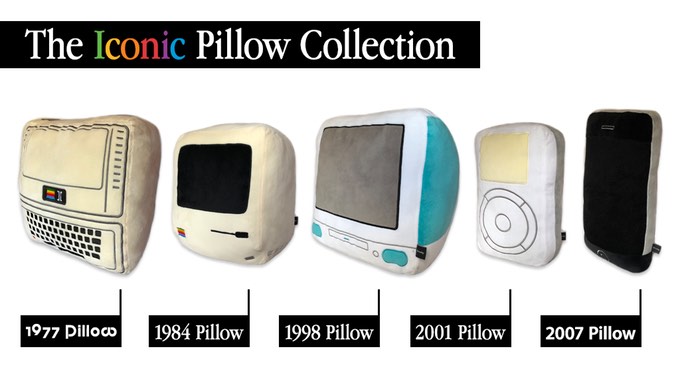
Throwboy has a collection of different plush pillow options modeled after Apple designs, with each pillow priced at $30 to $40. The main collection of Iconic pillows is meant to look like classic Apple devices including the 1984 original Macintosh, the 1998 iMac G3, the 2001 iPod, and the 2007 original iPhone.
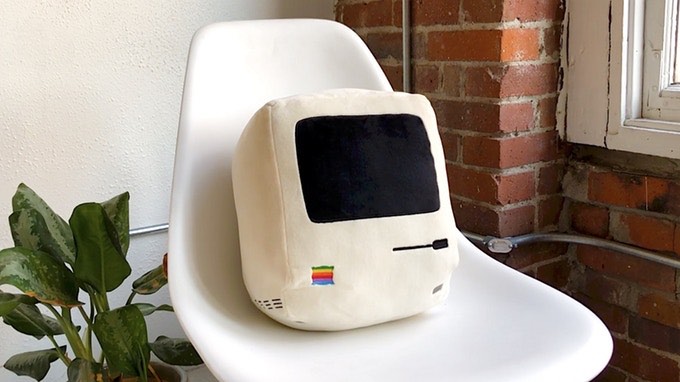
There are also other designs available from the Throwboy website like the classic Finder icon and the rainbow colored Spinning Wheel pillow modeled after the Mac's infamous wheel of death.
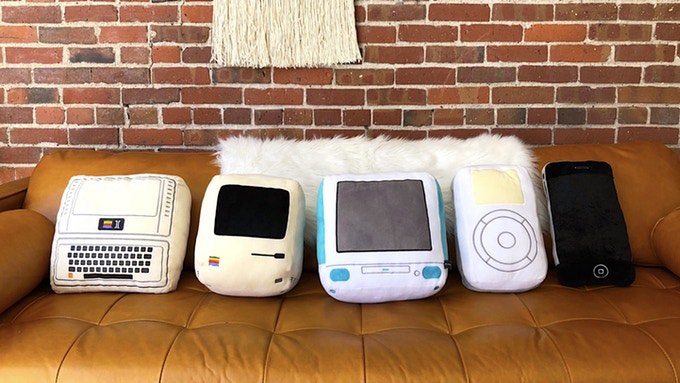
Each Throwboy pillow features intricate embroidery to match the detailing on the Apple product they're meant to look like. The 1998 pillow, modeled after the original iMac G3, features bright Bondi Blue fabric with details like the CD slot, power button, and more.
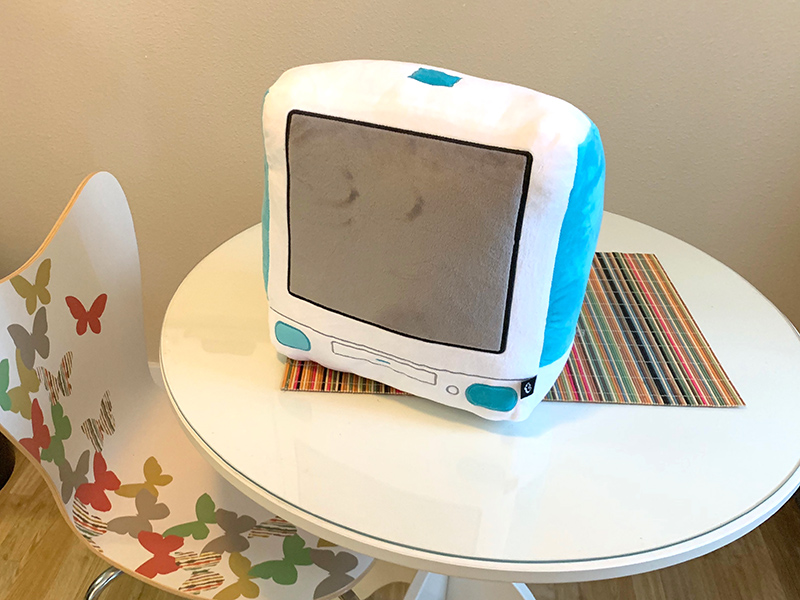
The 1984 pillow designed to look like the Classic Macintosh has a rainbow logo, floppy disk drive, and iconic square shape, and the 1977 Apple II pillow has embroidered keys, a rainbow logo, and other true to life detailing.

The 2001 pillow modeled after Apple's original iPod features click wheel embroidery, the 2007 pillow looks just like the original iPhone with thick black bezels and a white body, and the multi-colored spinning wheel pillow is a life size version of the Mac icon.
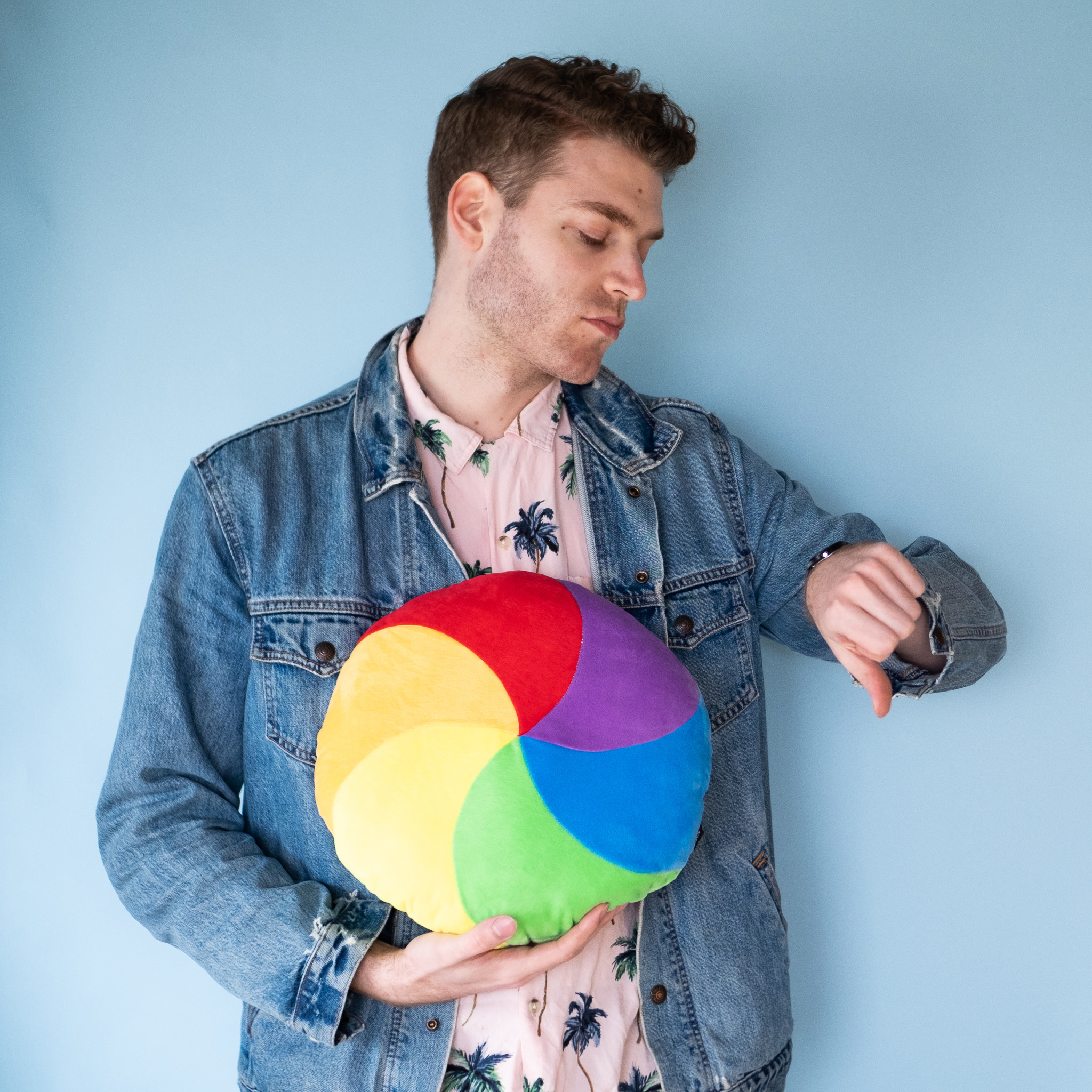
All of Throwboy's plushes are soft, huggable, and the ideal size to use as a throw pillow on a couch or a chair. The Iconic pillow collection is also a great gift idea that would be perfect for any Apple fan.
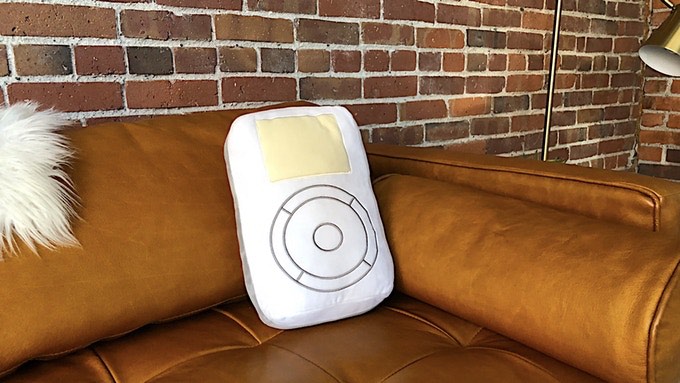
We have 10 of Throwboy's pillows to give away, and each winner will be able to pick their favorite pillow: iMac G3, iPod, Apple II, Classic Macintosh, Finder Icon, and original iPhone. To enter to win our giveaway, use the Gleam.io widget below and enter an email address. Email addresses will be used solely for contact purposes to reach the winners and send the prizes. You can earn additional entries by subscribing to our weekly newsletter, subscribing to our YouTube channel, following us on Twitter, following us on Instagram, or visiting the MacRumors Facebook page.
Due to the complexities of international laws regarding giveaways, only U.S. residents who are 18 years or older and Canadian residents (excluding Quebec) who have reached the age of majority in their province or territory are eligible to enter. To offer feedback or get more information on the giveaway restrictions, please refer to our Site Feedback section, as that is where discussion of the rules will be redirected.
Throwboy Giveaway
The contest will run from today (July 17) at 11:00 a.m. Pacific Time through 11:00 a.m. Pacific Time on July 24. The winners will be chosen randomly on July 24 and will be contacted by email. The winners will have 48 hours to respond and provide a shipping address before new winners are chosen.
For those that want to purchase a pillow, Throwboy is offering a 15 percent discount with promo code "rumors" when checking out. The deal will be available until Sunday, July 19.
This article, "MacRumors Giveaway: Win an Apple-Themed Plush Pillow From Throwboy" first appeared on MacRumors.com
Discuss this article in our forums

from MacRumors: Mac News and Rumors - All Stories https://ift.tt/3heNed7
For this week's giveaway, we've teamed up with Throwboy to offer MacRumors readers a chance to win a plush, squeezable version of a classic Apple product like an original iPhone, Classic Macintosh, iMac G3, original iPod, and more.
Throwboy has a collection of different plush pillow options modeled after Apple designs, with each pillow priced at $30 to $40. The main collection of Iconic pillows is meant to look like classic Apple devices including the 1984 original Macintosh, the 1998 iMac G3, the 2001 iPod, and the 2007 original iPhone.
There are also other designs available from the Throwboy website like the classic Finder icon and the rainbow colored Spinning Wheel pillow modeled after the Mac's infamous wheel of death.
Each Throwboy pillow features intricate embroidery to match the detailing on the Apple product they're meant to look like. The 1998 pillow, modeled after the original iMac G3, features bright Bondi Blue fabric with details like the CD slot, power button, and more.

The 1984 pillow designed to look like the Classic Macintosh has a rainbow logo, floppy disk drive, and iconic square shape, and the 1977 Apple II pillow has embroidered keys, a rainbow logo, and other true to life detailing.
The 2001 pillow modeled after Apple's original iPod features click wheel embroidery, the 2007 pillow looks just like the original iPhone with thick black bezels and a white body, and the multi-colored spinning wheel pillow is a life size version of the Mac icon.

All of Throwboy's plushes are soft, huggable, and the ideal size to use as a throw pillow on a couch or a chair. The Iconic pillow collection is also a great gift idea that would be perfect for any Apple fan.
We have 10 of Throwboy's pillows to give away, and each winner will be able to pick their favorite pillow: iMac G3, iPod, Apple II, Classic Macintosh, Finder Icon, and original iPhone. To enter to win our giveaway, use the Gleam.io widget below and enter an email address. Email addresses will be used solely for contact purposes to reach the winners and send the prizes. You can earn additional entries by subscribing to our weekly newsletter, subscribing to our YouTube channel, following us on Twitter, following us on Instagram, or visiting the MacRumors Facebook page.
Due to the complexities of international laws regarding giveaways, only U.S. residents who are 18 years or older and Canadian residents (excluding Quebec) who have reached the age of majority in their province or territory are eligible to enter. To offer feedback or get more information on the giveaway restrictions, please refer to our Site Feedback section, as that is where discussion of the rules will be redirected.
The contest will run from today (July 17) at 11:00 a.m. Pacific Time through 11:00 a.m. Pacific Time on July 24. The winners will be chosen randomly on July 24 and will be contacted by email. The winners will have 48 hours to respond and provide a shipping address before new winners are chosen.
For those that want to purchase a pillow, Throwboy is offering a 15 percent discount with promo code "rumors" when checking out. The deal will be available until Sunday, July 19.
Tag: giveaway
This article, "MacRumors Giveaway: Win an Apple-Themed Plush Pillow From Throwboy" first appeared on MacRumors.com
Discuss this article in our forums
from MacRumors: Mac News and Rumors - All Stories https://ift.tt/3heNed7
Necrobarista Launches on Apple Arcade: 'Death, Coffee, and Feelings'
https://ift.tt/3eBnaH9
Experience a spellbinding story of necromancy, friendship, and letting go in "Necrobarista," this week's addition to Apple Arcade on the iPhone, iPad, Apple TV, and Mac. The game hails from Australian developer Route 59.

From the App Store description:
Necrobarista is also launching on Steam and GOG on July 22.
This article, "Necrobarista Launches on Apple Arcade: 'Death, Coffee, and Feelings'" first appeared on MacRumors.com
Discuss this article in our forums

from MacRumors: Mac News and Rumors - All Stories https://ift.tt/3h3AjKO
Experience a spellbinding story of necromancy, friendship, and letting go in "Necrobarista," this week's addition to Apple Arcade on the iPhone, iPad, Apple TV, and Mac. The game hails from Australian developer Route 59.

From the App Store description:
In a back-alley Melbourne cafe, the dead are granted one last night to mingle with the living."Necrobarista" is available on the App Store with an Apple Arcade subscription. The service provides iPhone, iPad, Apple TV, and Mac users with access to over 100 games with no in-app purchases or ads for $4.99 per month.
For Maddy Xiao—barista, amateur necromancer, and new owner of the Terminal—things couldn't be better, as long as you're not reminding her of the fact that she's got an enforcer from the notoriously uncompromising Council of Death breathing down her neck.
Necrobarista is also launching on Steam and GOG on July 22.
Tag: Apple Arcade
This article, "Necrobarista Launches on Apple Arcade: 'Death, Coffee, and Feelings'" first appeared on MacRumors.com
Discuss this article in our forums
from MacRumors: Mac News and Rumors - All Stories https://ift.tt/3h3AjKO
Subscribe to:
Posts (Atom)